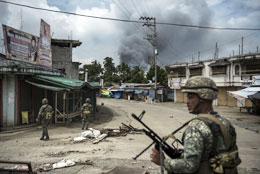ISIS’ core helps fundmilitants in Philippines

The attack by Islamic State group-affiliated militants on a Philippine city has galvanized its Southeast Asian supporters and spells trouble for the region, a top terrorism researcher said Friday as the occupation of Marawi nears two months despite a sustained military offensive.
In a new report, Sidney Jones, an expert on militant networks in Southeast Asia at the Jakarta-based Institute for Policy Analysis of Conflict, said there now may be a higher risk of attacks in other Philippine cities and cooperation between militants across regional borders could expand. Militants in Indonesia and Malaysia will want to redouble efforts to attack police and may also lift their sights to targeting foreigners, she said.
"The initial photographs from Marawi released over social media as the ISIS assault began — smiling fighters hold guns aloft on trucks — seemed to have the same impact as the iconic ISIS victory photos from Mosul in 2014," Jones said, using another acronym for IS and referring to its past occupation of Iraq's second-largest city. "They generated a shared sense of triumph and strengthened the desire of ISIS supporters in the region to join the battle."
Waving IS-style black flags, the heavily armed fighters stormed into Marawi, a center of Islamic faith in the south of the predominantly Roman Catholic Philippines, on May 23, occupying buildings, houses and mosques and taking hostages. Foreign fighters, including 20 Indonesians, joined the insurrection, which officials and researchers say received funding locally and from IS in Syria that was coordinated by a Malaysian known as Mahmud bin Ahmad.
At least 565 people, including 421 militants and 99 soldiers and police, have been killed in the worst urban uprising by Muslim militants in the volatile southern Philippines in decades. Nearly half a million residents have been displaced in Marawi and outlying towns by the fighting.
Philippine President Rodrigo Duterte said the Marawi crisis should be over soon, but that he has asked troops not to launch an all-out assault that might prompt the militants to kill their hostages.
"We'll just have to wait it out. I told them, 'do not attack,'" Duterte said in a speech at a business conference in the southern Philippine city of Davao. "If we have to wait there for one year, let us wait for one year."
Military officials have said 300 civilians may be held by the militants or trapped in their homes by the fighting.
Jones said Indonesians and Malaysians who joined the fight in Marawi could return to their countries, and with their high prestige provide new leadership, uniting factionalized pro-IS cells.
But a Marawi-style attack in Indonesia, the world's most populous Muslim nation, is unlikely because unlike the southern Philippines, it does not have the multiple insurgencies that extremists can draw on for fighters and weapons, she said.
The report was based on research in the southern Philippine region of Mindanao, interviews with Indonesian militants, credible news reports including from The Associated Press and monitoring of pro-IS groups on the Telegram instant messaging app.
When the militants holding out in Marawi are defeated, the rebuilding of the city, which has pounded by airstrikes, will be crucial for the Philippines and Southeast Asia, according to Jones.
Officials need to give those displaced a voice in the rebuilding of Marawi and prevent extremist teachings from finding fertile ground, she said.
"Recruiters (for militant groups) were able to build on the narrative of state brutality long before the battle for Marawi began, but the military's reliance on airstrikes ... enabled the fighters to blame the government for the city's destruction," she said.
A NYT report said the central command of the Islamic State in Syria has funneled tens of thousands of dollars to militants in the Philippines over the last year.
The report describes how Mahmud Ahmad, a high-level Islamic State figure from Malaysia, who is based near Marawi, worked through the group’s chain of command to Syria to get money and international recruits to help local militants seize territory in the Philippines for the caliphate.
After the militants seized Marawi in late May, they raised the Islamic State flag and declared the establishment of a new province of the organization, also known as ISIS or ISIL. Some senior politicians in the Philippines have dismissed the Maute Group, the major Islamist militant group behind the seizure of Marawi, as “ISIS wannabes,” characterizing it as a drug mafia with little in common with the ideologically driven Islamic State fighters.
But the report suggests that Islamic State commanders in Syria took the Maute Group’s strategic ambitions seriously.
The Islamic State’s ability to financially support its Philippine offshoots appears limited mainly to periodic Western Union transfers of tens of thousands of dollars, the report found, suggesting that direct support from Syria was a relatively minor factor in the Maute Group’s ability to seize Marawi.
The report argues that local recruiting and fund-raising among pious Muslims who resented the Philippines’ central government have probably played a more significant role in the insurgents’ successes.
Intercepted chats show that the Islamic State has a sophisticated command structure in Southeast Asia, allowing for complex coordination among its supporters across the region, the report said.
The report calls for Indonesia, Malaysia and the Philippines to improve their security services’ coordination and intelligence sharing, so that the names of key suspects are passed along.
Still, the first step is ousting the Islamic State from Marawi, the report concluded.









